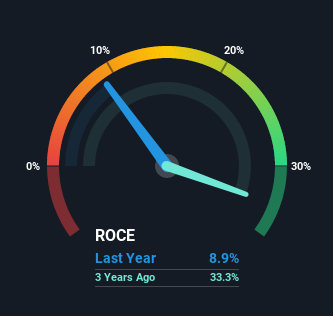- United Kingdom
- /
- Professional Services
- /
- LSE:HAS
Investors Could Be Concerned With Hays' (LON:HAS) Returns On Capital
To find a multi-bagger stock, what are the underlying trends we should look for in a business? Typically, we'll want to notice a trend of growing return on capital employed (ROCE) and alongside that, an expanding base of capital employed. This shows us that it's a compounding machine, able to continually reinvest its earnings back into the business and generate higher returns. Having said that, from a first glance at Hays (LON:HAS) we aren't jumping out of our chairs at how returns are trending, but let's have a deeper look.
Understanding Return On Capital Employed (ROCE)
Just to clarify if you're unsure, ROCE is a metric for evaluating how much pre-tax income (in percentage terms) a company earns on the capital invested in its business. Analysts use this formula to calculate it for Hays:
Return on Capital Employed = Earnings Before Interest and Tax (EBIT) ÷ (Total Assets - Current Liabilities)
0.089 = UK£94m ÷ (UK£1.9b - UK£823m) (Based on the trailing twelve months to June 2021).
Therefore, Hays has an ROCE of 8.9%. In absolute terms, that's a low return and it also under-performs the Professional Services industry average of 12%.
View our latest analysis for Hays

Above you can see how the current ROCE for Hays compares to its prior returns on capital, but there's only so much you can tell from the past. If you'd like, you can check out the forecasts from the analysts covering Hays here for free.
What Can We Tell From Hays' ROCE Trend?
On the surface, the trend of ROCE at Hays doesn't inspire confidence. Over the last five years, returns on capital have decreased to 8.9% from 34% five years ago. However it looks like Hays might be reinvesting for long term growth because while capital employed has increased, the company's sales haven't changed much in the last 12 months. It may take some time before the company starts to see any change in earnings from these investments.
On a side note, Hays has done well to pay down its current liabilities to 44% of total assets. So we could link some of this to the decrease in ROCE. Effectively this means their suppliers or short-term creditors are funding less of the business, which reduces some elements of risk. Some would claim this reduces the business' efficiency at generating ROCE since it is now funding more of the operations with its own money. Keep in mind 44% is still pretty high, so those risks are still somewhat prevalent.
In Conclusion...
To conclude, we've found that Hays is reinvesting in the business, but returns have been falling. Unsurprisingly, the stock has only gained 17% over the last five years, which potentially indicates that investors are accounting for this going forward. As a result, if you're hunting for a multi-bagger, we think you'd have more luck elsewhere.
If you're still interested in Hays it's worth checking out our FREE intrinsic value approximation to see if it's trading at an attractive price in other respects.
For those who like to invest in solid companies, check out this free list of companies with solid balance sheets and high returns on equity.
Valuation is complex, but we're here to simplify it.
Discover if Hays might be undervalued or overvalued with our detailed analysis, featuring fair value estimates, potential risks, dividends, insider trades, and its financial condition.
Access Free AnalysisHave feedback on this article? Concerned about the content? Get in touch with us directly. Alternatively, email editorial-team (at) simplywallst.com.
This article by Simply Wall St is general in nature. We provide commentary based on historical data and analyst forecasts only using an unbiased methodology and our articles are not intended to be financial advice. It does not constitute a recommendation to buy or sell any stock, and does not take account of your objectives, or your financial situation. We aim to bring you long-term focused analysis driven by fundamental data. Note that our analysis may not factor in the latest price-sensitive company announcements or qualitative material. Simply Wall St has no position in any stocks mentioned.
About LSE:HAS
Hays
Engages in the provision of professional and skilled recruitment services in Germany, the United Kingdom, Ireland, Australia, New Zealand, and internationally.
Excellent balance sheet and fair value.
Similar Companies
Market Insights
Community Narratives



